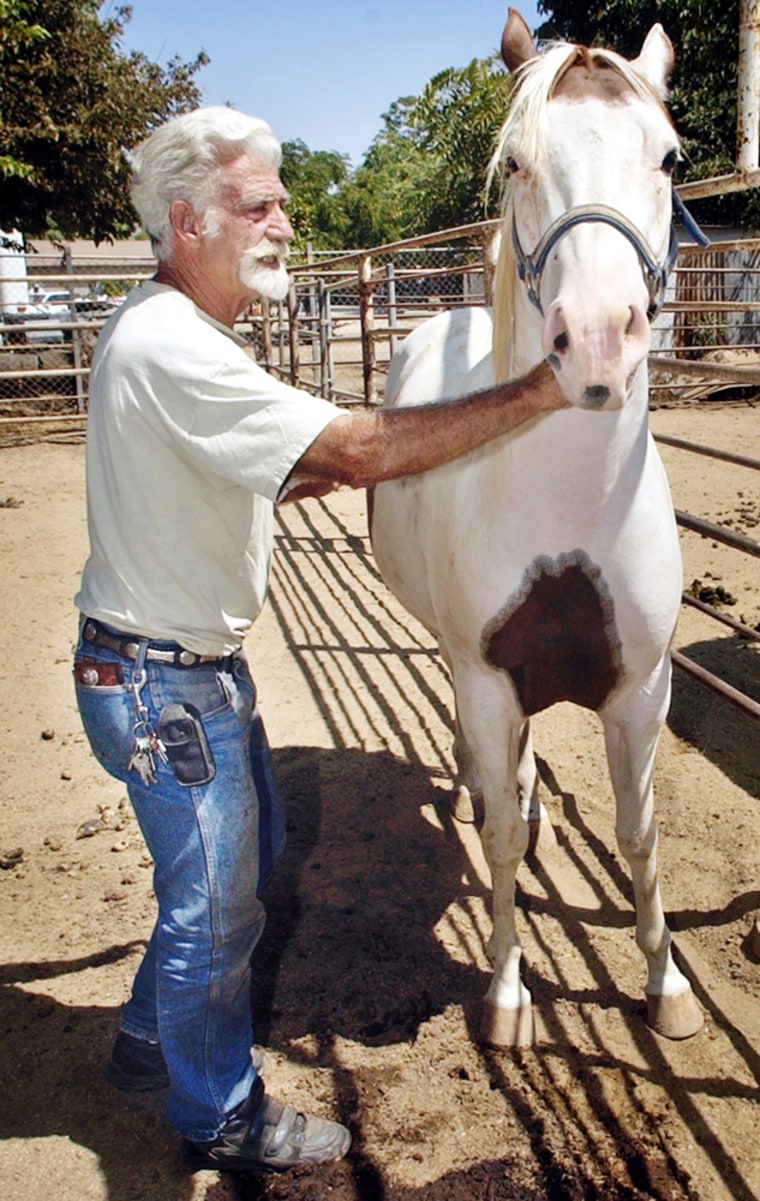Rowdy, a 4-year-old horse, got sick after splashing through the Santa Ana River on a training ride. He ran a high fever, moved feebly in his stall and just wanted to sleep — all symptoms of West Nile virus.
Owner Mike Polder said Rowdy only had one of the two vaccination shots recommended to combat West Nile in horses. Two of his other horses, 4-year-old Spirit and 9-year-old Shercon, were not vaccinated at all and also became seriously ill.
“It was a nightmare,” said Ingrid Encinas, Polder’s wife, who nursed the horses back to health with massive doses of B vitamins and aspirin. Of her initial impression of the West Nile threat, she says: “Like a lot of things, I thought it was just a big hullabaloo.”
Polder and Encinas were not alone in discounting the risk West Nile poses to animals. Numerous horse owners in California have failed to properly vaccinate their animals.
“The reason the horses are getting infected is because people aren’t heeding the warnings that have been out there for more than two years now,” said Rick Wagner, vice president of the horsemen’s association.
Norco, also known as “Horse Town USA” because of its many ranches, rodeos and trails, is located in Riverside County, where 31 horses have died this year from West Nile — the most of any county in the state.
Outbreak may get worse
The mosquito-born illness has killed at least 10 people and 82 horses so far this year in California. Across the nation, there have been more than 350 confirmed cases among horses.
“We’re expecting the possibility of at least a continued significant rate of infection, and it may get worse,” said Steve Lyle, a spokesman for the state agency, who urged horse owners to vaccinate their animals.
It costs about $50 to $70 for the two shots, which are given about four weeks apart. By comparison, veterinarians charge $100 to put a horse down.
The virus threat has become a hot topic in Norco, a horse-proud place where motorists can face a $125 fine for blocking the horse trails that pass homes throughout the city.
Nancy Fite, a reserve sheriff’s captain, was out recently riding Boomer, a 4-year-old grulla-colored quarterhorse, and stopped to talk to her friend, Virginia Rogers.
Boomer is part of the Los Angeles County Sheriff Department’s mounted posse unit and was vaccinated two years ago when he first arrived in California, Fite said.
“Everyone is vaccinating,” Rogers said.
West Nile virus, which was first isolated in Uganda in 1937, made its first appearance in the United States in New York in 1999 and has been spreading westward since.
30 percent die from infection
The first reported outbreak among horses occurred in the summer of 1962 in the Camargue region of France. Other major outbreaks were reported in Morocco in 1996 and again in France in 2000.
More than 340 people in California have tested positive for the disease this year, the state Department of Health Services reported. More people have died in California than any other state in the nation.
About 1 percent of humans infected with the virus become seriously ill or die, but it can be fatal to as many as 30 percent of all horses that contract it, Lyle said.
About 5,000 horses were sickened last year by the virus.
In Norco, the threat to humans and horses is readily apparent. A flier stapled to a wooden post on a bluff above the Santa Ana River reads, “WARNING. You are entering an area known to be positive for West Nile Virus.”
The message wasn’t lost on Mike Wilcox, a Norco resident and horseshoer, who has vaccinated his five horses against West Nile virus for the past three years.
“I took it serious,” Wilcox said. “I haven’t heard of a case yet where there was a vaccination and they had to put a horse down.”
